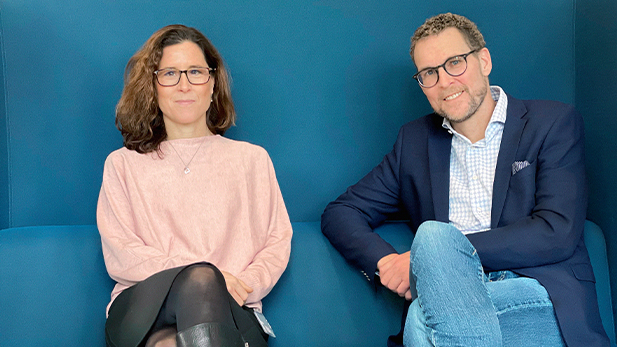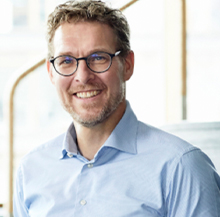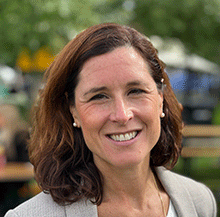“We want to shape people who dare and want to take social responsibility”

Photo: CBS
Copenhagen Business School has drawn up nine capabilities that will enable students to reflect on how they can contribute to new solutions and a positive future. Why?
Nikolaj Malchow-Møller: Because we are convinced that the expectations, we have of future graduates are different from what they used to be. Our graduates must live up to the expectations we have of leaders in terms of taking responsibility for the society as a whole, e.g. the environment, but also in terms of social issues. This is only possible if our graduates are able to put their knowledge and professionalism to use in a broader, social context. I see it as our duty, as a place of education, to provide our students with the skills that we believe they will need in the future labour market. A labour market where business is much more than merely business, and where the ability to act ethically and responsibly will only become more and more important.
Anna Thomasson: You could say that the Nordic Nine is our way of doing all we can to best prepare our students for a world we do not, as yet, know. Today, it is common practice to move about the labour market a great deal, while the future becomes more and more unpredictable. This means that our graduates must have a larger tool box and the ability to acquire new knowledge and new capabilities. By way of example, one of the capabilities includes learning for life, which is a really good example of the essence of the Nordic Nine, which in addition to concrete business economic skills provides the students with a more holistic, interdisciplinary education, which we believe to be important for the advancement of innovation and collaboration.
Why should Copenhagen Business School ensure that students are able to take up a moral position rather than merely preparing them academically?
Anna: Naturally, our students should master the most basic business skills. However, we believe that it takes more: the ability to take an analytical perspective in terms of the difficult challenges and dilemmas they will encounter. A good example is capability number two, which states that “you are analytical with data and curious about ambiguity”. Data and digitalisation are spreading to all areas of our lives, and so, the ability to work with data is incredibly important. However, data never provide black and white answers. Instead, data provide insight that can help us ask the right and critical questions.
Nikolaj: Nordic Nine is also about learning how to act morally and ethically, because we know that our students will be placed in situations where it will be expected of them, both by society in general, but also by the companies they work for. Milton Friedman’s famous saying: “The business of business is business” is no longer valid. Ensuring company profit is no longer sufficient. You also have to understand the social and ethical agendas and dare act on them. Just look at the discussions about whether or not companies should still be operating in Russia or the banks’ reputations following the money laundering cases. Or the surrounding society’s expectations that companies engage in the green transition. With Nordic Nine, we try to provide our students with some of the pointers that will help them steer in the right direction and help them shape a better future for us all.
Wherein lies the Nordic aspect of Nordic Nine?
Nikolaj: This is something we have given a lot of thought, and to me, it becomes particularly clear when I talk to people from outside the Nordic countries. Because they do see the Nordic countries as frontrunners in terms of taking social responsibility and coming up with solutions. By way of example, we have long tradition of trust, responsibility and collaboration between private and public organisations. And in addition, the Nordic countries share values in relation to, for example, the welfare state, education, entrepreneurship and research, which is a very good point of departure for developing efficient solutions to big-scale societal challenges.
Anna: And these are exactly the things that come up when I talk to international students, who have chosen to study in Denmark. With Nordic Nine, we also signal that we take our responsibility seriously, and that could prove very important for our ability to attract even more talented young people with an international perspective, which will be a gain for our educational environments but also our companies.
How does Nordic Nine benefit companies and organisations?
Nikolaj: Companies will get some brave employees, who will not shy away from dealing with difficult and complex assignments and dilemmas. When I talk to companies, they often tell me that they look for candidates who are ready to face and help solve difficult challenges, such as the green transition. So, I actually believe that we are kicking in an open door in terms of the companies that really need employees who can work with complex issues and understand them in a broad context.
Anna: And in fact, we have not developed Nordic Nine on our own, but in close dialogue with our surroundings. More than 3,000 people from the world of business and academia have participated in surveys and workshops and have contributed input that has since been boiled down to nine capabilities that correspond to the needs of society in general and the business world.
Is this a return to the old educational ideals, where institutions must advance the students’ personal development, critical sense and ability to reflect?
Nikolaj: That too, but not only. In my opinion, Nordic Nine is also about shaping people who dare take social responsibility. So, the educational ideal that includes being able to reflect and be critical is part of it, but Nordic Nine is much more than that.
Anna: In my opinion, Nordic Nine helps us take the educational ideal a step further. If you are well-educated, you are also able to see the wider perspective, which will benefit society in general. So, instead of merely focusing on being educated, Nordic Nine is also about using knowledge and our ability to reflect on things that will benefit the community.
Right now, we see a number of suggested changes to the education system (regionalisation, shorter master degrees, better continuing education, etc.). How does Nordic Nine play into this?
Anna: As a university, we are naturally governed from outside, but we also have a lot of room to act independently and come up with solutions. This is where Nordic Nine is a strong point of departure for thinking differently, which will keep us one step ahead and ensure that the future is not merely something that happens but something we help shape.
Nikolaj: Yes, changes should always be seen as possibilities, and Nordic Nine is definitely a point of departure for constructive involvement with political agendas. If we look at the debate about regionalisation, it is the result of an increasing inequality between rural and urban areas. Naturally, we want our students, our graduates and CBS as an institution to be a part of the solution. Which is why we have to look at how we can use the debate about regionalisation as an opportunity to offer solutions that may help turn the development around. Quite in correspondence with the thoughts behind Nordic Nine.
At the same time, you can consider the suggestion about shorter master degrees a political reaction to the challenge of lifelong learning, because part of the proposed action plan is to ensure our students access to lifelong learning. I have never before seen this suggested at a political level. And, naturally, we are also tasked with reforming the education system and finding some sustainable models for lifelong learning. To me, Nordic Nine is also a point of departure – both for our students and for CBS – to enter into these developments constructively.

